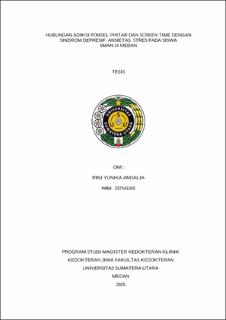| dc.description.abstract | Background: The increasing use of smartphones among adolescents has raised
concerns about its psychological impacts, particularly during the COVID-19
pandemic, which significantly elevated screen time. Previous studies suggest a
link between excessive device use and mood disorders such as depression,
anxiety, and stress. This study aims to analyze the relationship between
smartphone addiction and screen time with symptoms of depressive syndrome,
anxiety, and stress among students at SMAN 14 Medan.
Methods: This cross-sectional study involved 196 students selected through
consecutive sampling. Smartphone addiction was measured using the validated
SAS-SV instrument, while psychological symptoms were assessed using the
DASS-21. Data analysis employed chi-square tests followed by multivariate
logistic regression, with a significance level set at p<0.05.
Results: No significant relationship was found between smartphone addiction and
depressive symptoms (p=0.360), anxiety (p=0.474), or stress (p=0.619). Similarly,
screen time showed no significant association with depression (p=0.133), anxiety
(p=0.192), or stress (p=0.133).
Conclusion: The study did not find a significant association between smartphone
addiction or screen time and symptoms of depression, anxiety, or stress. However,
descriptively, students with signs of addiction tended to report higher
psychological symptoms. These findings support the theoretical perspective that
compulsive smartphone use, especially as a coping mechanism for negative
emotions, may contribute to long-term psychological distress such as anxiety and
stress. | en_US |


